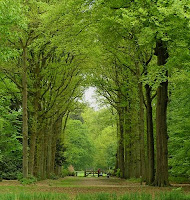 Anyone who has seen a play by Anton Chekhov may well have felt that the characters were living in a locked room. Not a locked room of a murder-mystery, in which one of the characters must be the murderer. Instead, a psychologically locked room, in which Chekhov's characters voice their failed dreams, never achieved projects, and unfulfilled desires. In one play in particular, however, Uncle Vanya, a beautiful green illumination occasionally shines into the psychologically somber atmosphere. It is the emerald light of a forest. And it tells us something about Nature and the human spirit.
Anyone who has seen a play by Anton Chekhov may well have felt that the characters were living in a locked room. Not a locked room of a murder-mystery, in which one of the characters must be the murderer. Instead, a psychologically locked room, in which Chekhov's characters voice their failed dreams, never achieved projects, and unfulfilled desires. In one play in particular, however, Uncle Vanya, a beautiful green illumination occasionally shines into the psychologically somber atmosphere. It is the emerald light of a forest. And it tells us something about Nature and the human spirit.Twice in the play, the light glimmers through the voice of Dr. Astrov, a physician who every year has planted new forests. Some of his lines seem to display remarkable foreknowledge of our current environmental challenges, especially given that the play was published in 1897. For example, in Act I:
"The forests diminish year after year, rivers dry up,
wildlife is coming to an end, the climate is spoiled...."
"When I plant a young birch and then see its leaves turn green
and the way it sways in the wind, my soul is filled with pride...."
When he describes the human relationship to the forests in more communal terms, he is able to describe it only in a distancing or critical way because he is discouraged. He quickly bores his distracted listener in Act III when he lays out on a table his series of maps charting the receding size of the forests over many years. Also, his depiction of any combined life of humans and forests is only grim:
"What we have here is a degeneration, the result of a downhill struggle for existence....
And so [man] destroys everything and never thinks about tomorrow...."
Thus, even though Astrov has nobly devoted much time and money to trying to sustain the forest, he cannot sustain a vision that will inspire other people. Nevertheless, the green illumination that merely glimmers through him flares more brightly through another character, Sonya. This is partly because she loves Astrov, but also because she is able to feel more loving toward all people. She is able to tenderly express a beautiful vision of how Astrov's reforestation work can be transformative:
"He says that the forests glorify our earth,
they teach a person the meaning of beauty and kindle a spirit of majesty.
The forests make the climate less severe. In countries where the climate is mild,
less energy is spent in the struggle with nature, and so there we find a gentler,
more understanding person. There too people are beautiful, pliant, and responsive;
their speech is elegant, and their movements are graceful."
 |
| Anton Chekhov |
~~~
Do you know someone in whom the love of nature shines? Can you describe their spirit?
(The quotations from Uncle Vanya by Anton Chekhov,
are from Anton Chekhov's Plays, translated by Eugene K. Bristow, © 1977.)
(A most accessible adaptation of the play is the movie version Vanya on 42nd Street.)
2 comments:
I never thought before about imagining how the beauty of the natural world could shine through a person because of their love for it. I liked your picture of the forest with the opening in which the sunlight is shining through. That image will stay with me. I know there must be such people who like nature that way, but I'll have to think about it more, but your article has given me new way to think about it.
I see a love of nature and reverence for it in many of my fellow botanists, who take delight in what they see. I've been lucky enough to be on walks with scientists who study lichens and mosses and mushroom. We never get to walk very far before they all end up on hands and knees, with their noses inches from the dirt and their bottoms in the air, watching some minute plant. It is a humorous and reverent experience.
Post a Comment